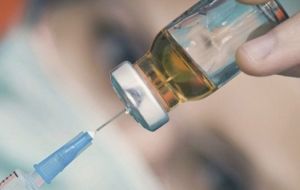MercoPress. South Atlantic News Agency
Mexico brings up the issue of liabilities from unexpected side effects of the Covid-19 vaccines
 “If that contingency arises, these funds can be obtained from the treasury,” Martha Delgado, deputy foreign minister in charge of international response to the pandemic
“If that contingency arises, these funds can be obtained from the treasury,” Martha Delgado, deputy foreign minister in charge of international response to the pandemic  Under the WHO COVID-19 vaccine plans, known as COVAX, 92 poor countries are eligible to access vaccines at lower or no cost until the end of 2021.
Under the WHO COVID-19 vaccine plans, known as COVAX, 92 poor countries are eligible to access vaccines at lower or no cost until the end of 2021. Mexico's government will pay to cover any liabilities arising from unexpected side effects of COVID-19 vaccines but is not considering creating a fund to do so, a top official said.
As various vaccine candidates make their way through different stages of clinical trials, it is unclear who foots the bill if people in poor countries fall sick from treatments.
“If that contingency arises, these funds can be obtained from the treasury,” Martha Delgado, the deputy foreign minister in charge of Mexico's international response to the pandemic, said in an interview.
“There are levels of risk and we have to assume them,” she added, noting that no special fund was planned.
Under the World Health Organization's (WHO) COVID-19 vaccine plans, known as COVAX, 92 poor countries are eligible to access vaccines at lower or no cost until the end of 2021.
Mexico believes potential side effects will likely be caught during the vaccine trials and by health authorities.
”I don't believe the WHO and its entire network of associations ... would launch (a vaccine) and make available to over 100 countries something that is questionable from the point of view of safety or responsibility,“ said Delgado.
Allegedly WHO has left the issue of financial claims unresolved, as it seeks to ensure that the injections are distributed fairly. Not participating in COVAX agreements was riskier for Mexico, she said: ”How much does that risk cost?“ she asked.
The terms for joining COVAX are the same for all signatories, but ”if you don't have that agreement, you don't have COVAX, full stop,“ Delgado said.
The government wants to vaccinate nearly all of Mexico's population against coronavirus by the end of 2021 after reaching deals with pharmaceutical companies Pfizer, AstraZeneca and CanSino, plus with COVAX.
Delgado expects the first vaccine doses to come from the pharmaceutical firms that have promised the earliest deliveries. COVAX has not committed to a date, while Pfizer has offered to start delivering as early as December, she noted.
Delgado had expected vaccinations to begin by April 2021 but now believes it could be sooner.
”The worst scenario for Mexico is that our (US) neighbors have a vaccination campaign four months before Mexico, and there's an issue of closed borders because in Mexico there's no vaccination campaign,“ said Delgado.
”We have to align these processes regionally,“ she added. ”If we start receiving vaccines in December, perhaps we could also start a vaccination campaign in January




Top Comments
Disclaimer & comment rulesCommenting for this story is now closed.
If you have a Facebook account, become a fan and comment on our Facebook Page!